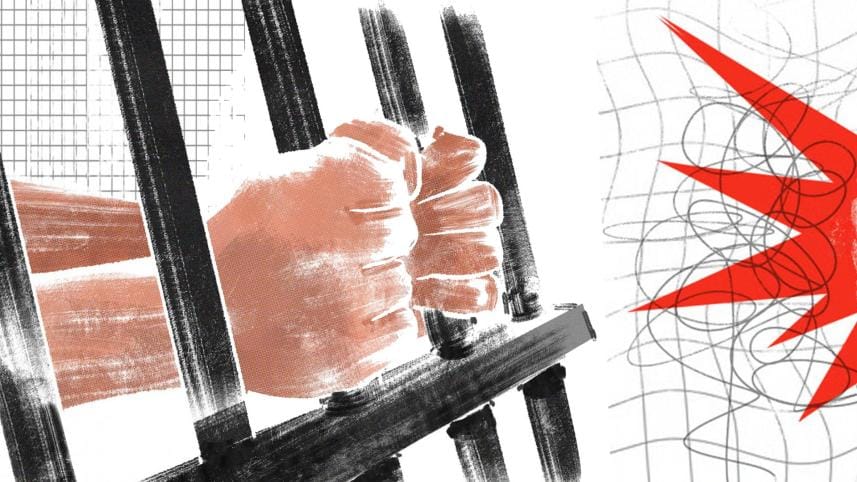The prison system is in urgent need of reform

"The degree of civilisation in a society can be judged by entering its prisons."
If this is true, then what does our prison system say about Bangladesh? Thousands are punished without conviction and stripped of their dignity in our prisons, compelling the question: who will reform the prison system?
Bangladesh's prisons continue to operate under the Prison Act of 1894, the Prisoners Act of 1900 and the Bengal Jail Code. These legal instruments, inherited from the British colonial regime, were designed for control and punishment, often dehumanising and serving no rehabilitative purpose. They are grossly inconsistent with the constitutional guarantees and human rights standards enshrined in international law.
The country operates 68 correctional facilities, including 55 district prisons and 13 central prisons, with a combined capacity of 42,887. Yet, the system remains overcrowded. Improvements are partial and unsustainable without deeper reforms. In late 2024, after the interim government was formed, calls grew to repeal colonial-era prison laws and modernise regulations.
Under international law, Bangladesh is bound by several conventions, including the International Covenant on Civil and Political Rights (ICCPR) and the Convention Against Torture and Other Cruel, Inhuman or Degrading Treatment or Punishment (CAT). Article 10(1) of the ICCPR stipulates: "All persons deprived of their liberty shall be treated with humanity and with respect for the inherent dignity of the human person." Similarly, the CAT obliges states to prevent torture in all circumstances. Yet in practice, such rights are regularly violated inside Bangladeshi penal institutions.
During the long, unjust detention of one of the authors (Khadijatul Kubra) under a Digital Security Act (DSA) case during the Awami League regime, the author witnessed first-hand the inner workings of Bangladesh's prison system, especially how disciplinary measures are implemented against female inmates. One striking example is the "case table" disciplinary culture. Inmates were routinely handcuffed to a fixed stand attached to a table, approximately 5.3 to 5.4 feet high. For minor infractions, women were forced to remain in that position for four to five hours a day, often without food, rest, or explanation. This continued for days, even weeks, and always without the opportunity to be heard by officials. It was a system devoid of basic fairness and humanity. This was not an isolated anomaly but part of a pattern of punishment without process, especially for women.
This method is psychologically debilitating and blatantly cruel, in direct contravention of Article 7 of the ICCPR, Articles 1 and 16 of the CAT, as well as Article 35(5) of our constitution.
Arbitrary use of condemned cells
Even more concerning is the arbitrary use of condemned cells, designated for death row inmates, as punishment for under-trial detainees. Khadijatul Kubra was confined to a condemned cell without charge, without hearing, or any explanation, at the order of the then senior jail superintendent, Obaidur Rahman. This practice is not isolated. For example, 16-year-old Poritosh Sarkar was reportedly kept in solitary confinement for eight months, barred from contact with others and denied sunlight or communication. This violates Section 29 of the Prisons Act, which states that no cell shall be used for solitary confinement unless the prisoner can talk to a prison officer at any time, and anyone kept there longer than 24 hours must be visited daily by a medical officer or subordinate.
Such acts also contravene the United Nations Standard Minimum Rules for the Treatment of Prisoners (the Nelson Mandela Rules), which enshrine proportionality and due process in prison discipline. Rules 36 to 46 state that solitary confinement or other very high-security measures should not be employed as a first choice, particularly in cases of persons not yet convicted.
Impunity of prison officials
Impunity for jail officials is a profound problem. When instances of abuse surface, the response is not disciplinary action but bureaucratic relocation. Human rights monitors note that, despite Bangladesh's 2013 Torture and Custodial Death (Prevention) Act, virtually no custodial abusers are ever held accountable. By mid-2025, only one conviction has been secured under that act.
In 2023, Runa Laila, an apprentice lawyer, was reportedly beaten by another inmate, political leader Papia of the Jubo Mohila League, while in custody. A stick was inserted through Laila's anus and vagina. She was then bound and gagged to a tree inside the jail premises, and sugar was poured over her body to attract ants to bite her. All of these (as seen by author Khadijatul Kubra) were orchestrated by Papia, with the assistance of the then Jailer Farhana Akhter under the authority of Obaidur Rahman. Rather than protecting the victim, Obaidur Rahman imposed punitive handcuffing on her. Later, Farhana Akhter ordered more beatings.
Victims and their families see no justice in mere transfers or brief salary demotions. In most cases, officials face no consequences at all. Notably, in all the cases mentioned, the same individuals—Obaidur Rahman and Farhana Akhter—were involved. They remain in their positions under powerful patronage, making a complete mockery of justice.
This failure of the prison system not only violates international legal obligations but also seriously undermines public confidence in the justice process. Justice must be absolute; it must flow beyond the courtroom. To this end, urgent and widespread legislative reform is required.
The archaic Prisons Acts and Jail Code should be repealed and replaced with a modern prison law that creates a bill of rights for prisoners in line with international standards, establishes independent oversight bodies, enforces a binding code of conduct for prison officials, ensures transparent and appealable disciplinary procedures within correctional facilities, and removes as well as prosecutes past offenders.
A promising step was taken on July 10, 2025, when the Council of Advisers approved Bangladesh's accession to the Optional Protocol to the Convention Against Torture (OPCAT). This lays the groundwork for establishing an independent National Preventive Mechanism (NPM) to monitor places of detention. The OPCAT also allows international oversight through visits by the UN Subcommittee on Prevention of Torture (SPT), enhancing transparency and accountability. It is equally imperative to revive and rigorously implement the Torture and Custodial Death (Prevention) Act, 2013.
The prison system is the missing pillar in Bangladesh's reform project. While there was an expectation that the interim government would initiate prison reforms and hold perpetrators accountable, no such steps have been taken yet. We had hope that victims would see culprits being brought to justice, but that hope is fading. Recent events intensify this failure. The consecutive deaths of Bawm prisoners following the regime change have laid bare the stark absence of progress.
No reform can be considered complete while our prisons continue to operate as sites of arbitrary power, systemic abuse, and legal vacuum. A just society is not only measured by how it treats the free, but also by how it treats those locked behind bars. The question is no longer "Who will reform our prisons?", it is "Will we allow this injustice to continue?"
Kazi Ayman Awsaf is a law student at East West University. He can be reached at aymanawsaf333@gmail.com.
Khadijatul Kubra is an undergraduate student at the Department of Political Science in Jagannath University and a member of the DSA Victims Network. She can be reached at khadijatulkubra541@gmail.com.
Views expressed in this article are the author's own.
Follow The Daily Star Opinion on Facebook for the latest opinions, commentaries and analyses by experts and professionals. To contribute your article or letter to The Daily Star Opinion, see our guidelines for submission.



 For all latest news, follow The Daily Star's Google News channel.
For all latest news, follow The Daily Star's Google News channel. 

Comments